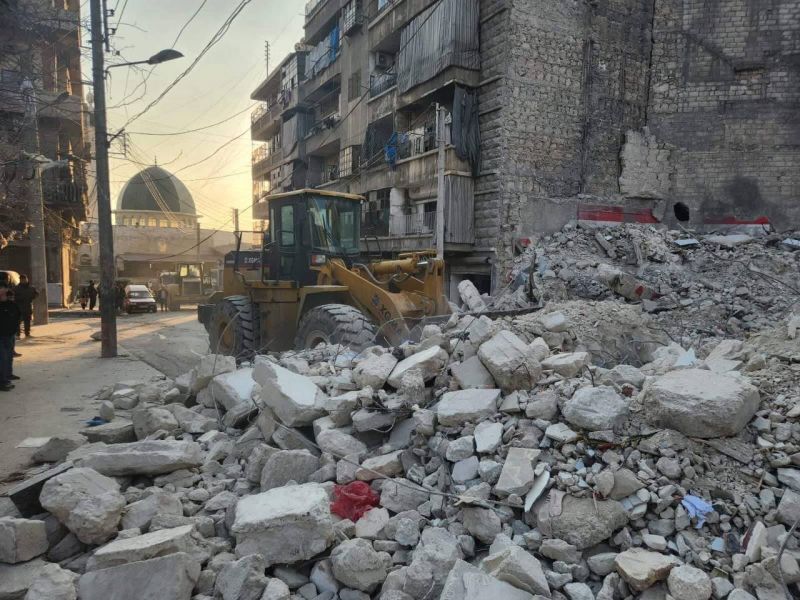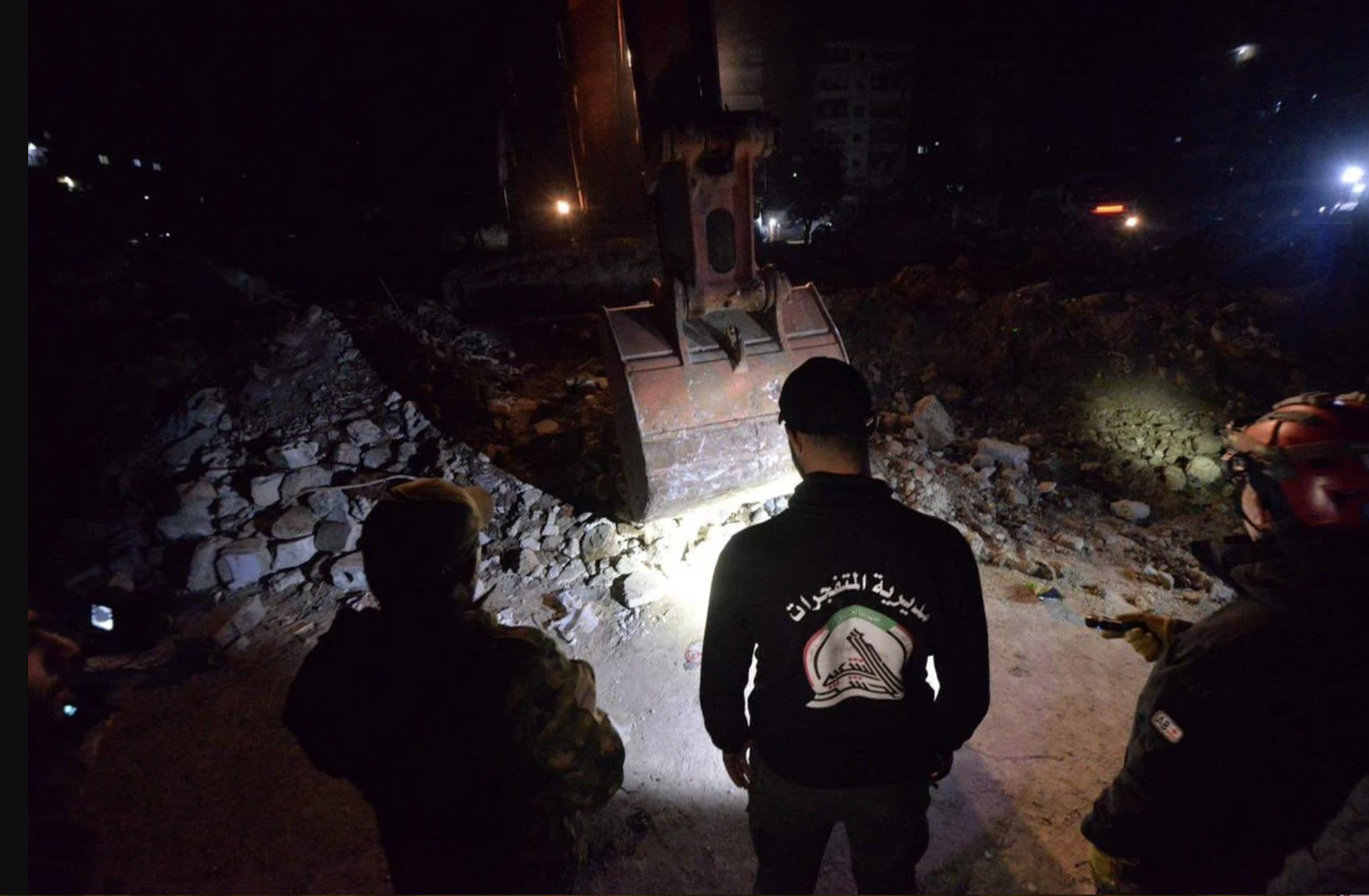
A construction vehicle collects rubble in the city of Aleppo on February 13, 2023. (Courtesy of al-Hashd al-Shaabi via Twitter)
A large poster fastened to a bridge in earthquake-devastated Aleppo reads:
“The inhabitants of Aleppo thank Iraqi Prime Minister Mohammed Shia al-Soudani and the leader of the Popular Mobilization Forces (al-Hashd al-Shaabi) Abdulaziz al-Muhammadawi for their courageous support for the people of Syria.”
The Syrian city was badly hit by the Feb. 6 earthquake that claimed over 41,000 lives in Syria and Turkey.
The Iran-aligned, Iraqi state-sponsored Al-Hashd al-Shaabi — composed of mostly Shia militiamen — announced its “humanitarian campaign” via Telegram, citing its delivery of winter clothes, food, medicine and baby formula. In addition to supplies, the forces deployed a rescue convoy organized by the militia's 27th brigade in Aleppo, which expressed its “joy in providing aid to its brothers in Syria.”
The same group that helped carry out a deadly siege of Aleppo's eastern neighborhoods seven years ago, as coordinated by Tehran, is once again back in th city. This time, the Iranian flags are accompanied by shovels rather than weapons.
According to Navvar Saban, an analyst at the Omran Center for Strategic Studies, Iran and its regional allies played a leading role in Allepo's destruction when they helped the Assad regime reclaim the city. Iran and its allies can now boast that they are supporting the city's wounded through their low-cost public relations operation, Saban explained.
“The scale of the destruction is significant in the areas hit by the earthquake to the point that, whatever help Iran provides, Syrians who have lost everything will consider it valuable.”
“Playing a role related to the earthquake represents a way to gain legitimacy among Syrians and Iraqis,” said Elizabeth Tsurkov, a researcher at the New Lines Institute.
Expanding soft power
“Since its participation in the operation to recapture the city in December 2016, [Iran's] Islamic Revolutionary Guard Corps has established its place into the landscape of Aleppo, through the management of public transport or even the extortion of some local businesses in exchange for protection,” Tsurkov said.
 A young man wearing a sweater with the al-Hashd al-Shaabi logo stands in front of rubble in the city of Aleppo on February 13, 2023. (Courtesy of al-Hashd al-Shaabi via Twitter)
A young man wearing a sweater with the al-Hashd al-Shaabi logo stands in front of rubble in the city of Aleppo on February 13, 2023. (Courtesy of al-Hashd al-Shaabi via Twitter)
But Iran's aid is not limited to cities like Aleppo, into which its influence had already seeped earlier in the Syrian Civil War, alongside Assad.
“Under the guise of humanitarian support, Iran has been able to extend its soft power tools in the coastal cities of Baniyas, Jableh and Latakia where it has been struggling until now to infiltrate,” said Saban.
Sabereen News, a channel on Telegram powered by armed pro-Iran groups, claimed that the commander of the Revolutionary Guards' elite Quds force, Esmail Ghaani, arrived on Feb. 8 in Aleppo “to oversee the delivery of aid to the Syrian people.” A photo of Ghaani with the governor of Latakia circulated on the internet soon after on Feb. 12.
Covering up strategic interests
Besides the movement of al-Hashd al-Shaabi convoy through the Bukamal border into eastern Syria, Tehran sent six planes filled with aid via airports in Latakia, Damascus and Aleppo—twice as many as those sent by Moscow, the Syrian regime's other sponsor.
Ayman Aldassouky, a researcher with the Middle East Directions Program, believes this to be an indicator of Iran's efforts to expand its influence in Syria while Moscow is busy with the war in Ukraine.
“Iran is using humanitarian aid as a cover to camouflage its strategic activities in Syria,” said Aldassouky. “Thus, the Islamic Republic is taking advantage of that to strengthen the air, sea and land routes that allow it to send weapons and supplies to Syria, by trying to take over the port of Latakia, while rebuilding its military bases destroyed by Israeli strikes .”
Saudi news outlet Elaph quoted a source from the Israeli military on Feb. 10 who claimed to have information revealing Iran's intention to use the natural disaster as a chance to send arms to its affiliated militias in the country.
The source warned that such a move would provoke Israeli forces to respond without hesitation.
Israel has been accused of executing regular air strikes in Syria against targets of interest to Iran and Hezbollah, but the country justifies its actions as national defense.
On Feb. 15, US forces shot down an Iranian drone flying over one of their bases in northeast Syria.
Beyond its military presence, Tehran intends to extend its influence to key sectors of the Syrian economy, which has been devastated by a 12-year war and endemic corruption.
“The effects of this earthquake will be devastating in the long term,” said Saban.
“Iran will be able to lead the market in many sectors, such as health, transportation and housing, areas in which the Syrian regime is unable to provide sufficient assistance to the victims of the disaster.”
This article was originally published in French in L'Orient-Le Jour. Translation by Joelle El Khoury.